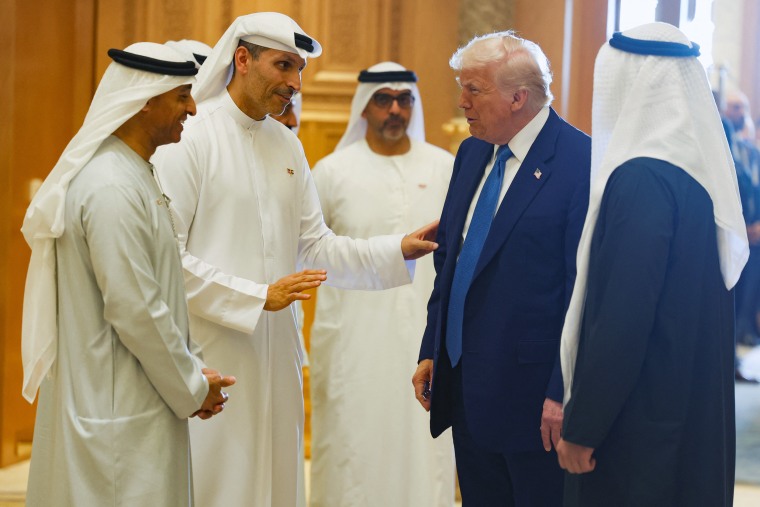ABU DHABI — As President Donald Trump hopscotched around the Middle East this week, he was the star of elaborate ceremonies, announced new U.S. policies and unveiled billions of dollars in new economic partnerships.
He even visited a mosque, remarking on the pride for he felt for “my friends” as he took in its beauty. “This is an incredible culture,” Trump said.
But one omission on the trip became more glaring with each stop: Israel.
Tensions between Trump and Israeli Prime Minister Benjamin Netanyahu were already bubbling up before the president spent the week visiting three of America’s key Arab allies: Saudi Arabia, Qatar and the United Arab Emirates.
By the end of the trip on Friday, Trump seemed to put further strain on the relationship. He had spent the past few days meeting with Syria’s new leader — a former al Qaeda leader the U.S. had put a $10 million bounty on — and announced he was lifting sanctions on the country in a move Israel opposed but one that Crown Prince Mohammed bin Salman of Saudi Arabia had urged the president to take.
Follow live politics coverage here
Trump told reporters he had discussed the sanctions decision with Netanyahu, framing it as widely supported by others.
“I think it’s been very popular, certainly in the Middle East,” Trump said. He also cited conversations with bin Salman and Turkey’s Recep Tayyip Erdogan who, he claimed, saw the move as critical to its chance of survival as a country.
A day after promising to lift the sanctions, Trump praised Syrian President Ahmed al-Sharaa as a “young, attractive guy — tough guy,” and urged the former rebel fighter to join the Abraham Accords — the president’s signature foreign policy achievement from his first term that normalized ties between Israel and several Arab states.

During the trip, Trump also leaned into the notion of a deal with Iran being within striking distance, without putting forward any details to assuage some of Israel’s concerns. And on the eve of the president’s trip, his administration announced it had cut a unilateral deal with Hamas, the U.S.-designated terrorist organization that attacked Israel on Oct. 7, 2023, to secure the release of the last living American hostage in Gaza.
“Hopefully this is the first of those final steps necessary to end this brutal conflict,” Trump said of the release of Edan Alexander. He added on Friday that “we’re going to find out pretty soon” if Israel is able to free the nearly two dozen hostages believed to be alive in Gaza.
Netanyahu, meanwhile, bombed Gaza during Trump’s trip to the region, killing more than 100 people in the last 24 hours, according to local health authorities.
Asked about Israel’s plans for expanding the war in Gaza, as he pushes for a ceasefire, Trump struck a measured tone.
“I think a lot of good things are going to happen over the next month, and we’re going to see. We have to help also out the Palestinians,” Trump said. “You know, a lot of people are starving on Gaza, so we have to look at both sides.”
Even so, Israel is increasingly anxious about Trump striking a quick nuclear deal with Iran and Arab leaders shaping the president’s thinking, one person familiar with the dynamic between Trump and Netanyahu said.
“The trip hasn’t so much put distance between Trump and Netanyahu as it has exposed it,” this person said.
Trump, speaking to reporters, dismissed the notion that his trip marginalized America’s closest ally in the region. He said on Wednesday that the U.S. having a strong relationship with Arab leaders is “very good for Israel.”
Across four breakneck days of deal-making, Arab leaders showed their ability to provide Trump with tangible economic wins he can showcase overseas as benefiting Americans back home, as well as the kind of warm welcome that resonates with the president.
“The job they’ve done in a fairly short period of time is just outstanding. They’re great people. Great leaders. Three great leaders,” Trump told reporters Friday as he headed back to Washington, D.C. “And the respect shown to our country was incredible. Because nobody is treated like that.”
Trump’s relationship with Netanyahu, by contrast, is largely focused on national security concerns, from Iran to the war in Gaza to the shifting dynamics in Syria.
So far, Israel has largely kept those concerns behind the scenes — which has not been the case with previous presidents, specifically Barack Obama and Joe Biden, even as they vowed to protect America’s “unbreakable bond” with Israel. And the U.S. continues to strongly support Israel, with Trump sending military equipment the Biden administration had paused.
In a statement, National Security Council spokesman James Hewitt described Trump as Israel’s staunchest ally in its history.
“Israel has had no better friend in its history than President Trump,” Hewitt said. “We continue to work closely with our ally Israel to ensure remaining hostages in Gaza are freed, Iran never obtains a nuclear weapon, and to strengthen regional security in the Middle East.”
Hewitt added, “As he has repeatedly stated in his first and second terms, the President is committed to ensuring Iran never obtains a nuclear weapon.”
As for where the dynamic between Trump and Netanyahu goes next, one ally of the president made the case that deepening ties with Arab leaders will ultimately protect Israel because of its close relationship with the U.S. At the same time, the ally noted Trump’s characteristic unpredictability, saying, “Trump does what Trump does.”